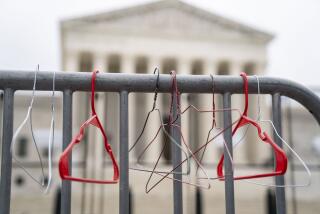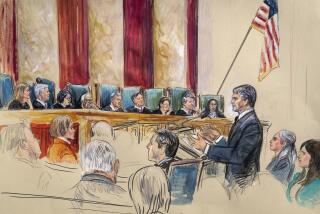Editorial: Amy Coney Barrett is qualified for the Supreme Court — but should not be confirmed

In nominating Amy Coney Barrett to succeed Justice Ruth Bader Ginsburg on the Supreme Court, President Trump has exercised a constitutional prerogative that he will enjoy up until Jan. 20, even if he is defeated in the November election. He also has chosen a legal scholar who is respected even by lawyers who disagree with her.
Neither of those facts requires that the Senate approve the nomination.
We continue to believe that the vacancy created by Ginsburg’s death so close to the Nov. 3 election shouldn’t be filled until after the inauguration of the winner of that election, whether it is Trump or Democratic nominee Joe Biden.
Ramming through a Supreme Court nomination would reward the hypocrisy of Senate Republicans who wouldn’t even consider President Obama’s nomination of Merrick B. Garland in 2016, also an election year, supposedly because it would deprive voters of a say in the choice of a new justice. A rushed confirmation also would exacerbate the poisonous partisanship that has infected the Senate confirmation process and undermine the credibility of the court.
That would be our position no matter who was chosen by Trump. But his selection of Barrett, a judge on the U.S. 7th Circuit Court of Appeals and a longtime law professor at the University of Notre Dame, is especially provocative and polarizing.
Given the nearness of election day and the fact that he already has installed two conservatives on the court, Trump could have made the conciliatory gesture of choosing an older jurist without a pronounced ideological profile. Instead, he selected Barrett, 48, whose record leads conservatives to hope — and liberals to fear — that she would cement a conservative majority on the courts for decades to come on issues ranging from affirmative action to gun control to immigration.
As in so many recent Supreme Court confirmations, the issue of abortion rights looms large with this nomination — and rightly so. It has been almost half a century since the court held in Roe vs. Wade that the Constitution guarantees a woman’s right to have an abortion in most cases. The “essential holding” of Roe was upheld in a 1992 decision, Planned Parenthood vs. Casey.
In planning their lives, women in America have relied on the access to safe and legal abortion secured by those decisions. Yet opponents of abortion rights, including those in state legislatures, continue their relentless campaign to chip away at the right to abortion in the hopes of ultimately undoing Roe. Trump has made it clear that he expects his Supreme Court appointees to join in that demolition.
Barrett should be questioned about whether she recognizes that Roe vs. Wade and other long-standing precedents in the court are entitled to respect, and that overruling a precedent causes a “jolt to the legal system,” as Chief Justice John G. Roberts Jr. said at his confirmation hearings in 2005.
That question must be asked not because Barrett is an observant Catholic who may believe that “life begins at conception” but because of what she has written on and off the bench.
In a 2013 law review article, Barrett wrote: “I tend to agree with those who say that a justice’s duty is to the Constitution and that it is thus more legitimate for her to enforce her best understanding of the Constitution rather than a precedent she thinks clearly in conflict with it.” In the same article, Barrett didn’t mention Roe vs. Wade among decisions that she said were “included on most hit lists of super-precedents.”
In 2018, Barrett joined the dissenting opinion of a colleague on the appeals court who suggested that the Supreme Court had left open the question of whether a state could ban abortion for the purpose of choosing the sex, race or other characteristics of children, as Indiana tried to do. The Supreme Court declined to consider that question, but Justice Clarence Thomas warned that it would soon need to address the constitutionality of laws like Indiana’s because of “the potential for abortion to become a tool of eugenic manipulation.” Does Barrett agree?
Senators also should question Barrett about her views about the scope of the 2nd Amendment. In 2019, she dissented from a 7th Circuit decision affirming that a businessman who pleaded guilty to mail fraud could lose his right to own a gun under statutes prohibiting the possession of a firearm by convicted felons. Stripping a nonviolent felon of the right to keep and bear arms, Barrett suggested, relegated the 2nd Amendment to the status of a “second-class right.”
It’s understandable that Democrats on the Senate Judiciary Committee might be tempted to boycott hearings on Barrett’s nomination as a way of protesting the unseemly rush to confirm a new justice at the end of Trump’s term. It would be better for them to attend the hearings and question Barrett closely but respectfully about her views, putting her answers on the record. Then they can — as should institutionalist Republicans — vote against her confirmation.
More to Read
A cure for the common opinion
Get thought-provoking perspectives with our weekly newsletter.
You may occasionally receive promotional content from the Los Angeles Times.






